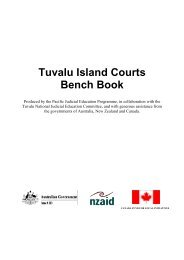Fiji Magistrates Bench Book - Federal Court of Australia
Fiji Magistrates Bench Book - Federal Court of Australia
Fiji Magistrates Bench Book - Federal Court of Australia
Create successful ePaper yourself
Turn your PDF publications into a flip-book with our unique Google optimized e-Paper software.
Actual knowledge <strong>of</strong>, or wilful blindness towards the circumstances which constitute the <strong>of</strong>fence<br />
is required. This does not mean the same mental state as that required by the principle party in<br />
the commission <strong>of</strong> the substantive <strong>of</strong>fence. Rather, the secondary party must know <strong>of</strong> the<br />
principal’s mental state and the facts which would make his or her purpose criminal.<br />
In Attorney-General Reference (No. 1 <strong>of</strong> 1975) [1975] 2 All ER 684, it was found that some sort<br />
<strong>of</strong> mental link is required between the principal <strong>of</strong>fender and the secondary party in order for<br />
there to be aiding and abetting. This requires that the principal <strong>of</strong>fender and the secondary party<br />
were together at some stage discussing the plans made in relation to the alleged <strong>of</strong>fence.<br />
In Wilcox v Jeffrey [1951] 1 All ER 464, the <strong>Court</strong> held that mere presence alone is insufficient<br />
to act as an encouragement. There must, on behalf <strong>of</strong> the secondary party, be an intention to<br />
encourage, or actual encouragement, beyond an accidental presence at the scene <strong>of</strong> the crime.<br />
In R v Allan [1965] 1 QB 130, the <strong>Court</strong> held that, to be a principal in the second degree to an affray,<br />
there must be some evidence <strong>of</strong> encouraging those who participated. <strong>Court</strong>s cannot convict a person for<br />
his or her thoughts unaccompanied by any other physical act beyond his or her presence.<br />
See also: Johnson v Youden [1950] 1 KB 554, per Lord Goddard; Gillick v West Norfolk and<br />
Wisbeach Area Health Authority [1986] 1 AC 112; R v Clarkson [1971] 3 All ER 344.<br />
Elements for Aiding or Abetting<br />
• An <strong>of</strong>fence must have been committed by the principal.<br />
• The defendant was acting in concert with the principal <strong>of</strong>fender<br />
(encouragement in one form or another is a minimal requirement).<br />
• There was some sort <strong>of</strong> mental link or meeting <strong>of</strong> minds between the<br />
secondary party and the principal <strong>of</strong>fender regarding the <strong>of</strong>fence.<br />
Counselling or Procuring: s21(1)(d) Penal Code<br />
Every person who counsels or procures any other person to commit an <strong>of</strong>fence is:<br />
• deemed to have taken part in committing the <strong>of</strong>fence and to be guilty <strong>of</strong> the <strong>of</strong>fence; and<br />
• may be charged with actually committing it or may be charged with counselling or<br />
procuring its commission: s21(1)(d) Penal Code.<br />
A conviction <strong>of</strong> counselling or procuring the commission <strong>of</strong> an <strong>of</strong>fence entails the same<br />
consequences as a conviction for the <strong>of</strong>fence as a principal <strong>of</strong>fender: s21(2) Penal Code.<br />
The term “to counsel or procure” generally describes advice and assistance given at an earlier<br />
stage in the commission <strong>of</strong> the <strong>of</strong>fence.<br />
<strong>Fiji</strong> <strong>Magistrates</strong> <strong>Bench</strong> <strong>Book</strong> April 2004
















